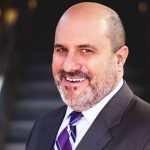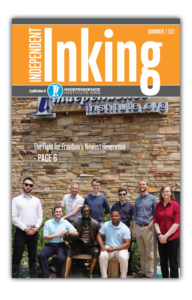INDEPENDENT INKING
I’ve been active in Colorado politics for three decades and I can confidentially say there has never been a more damaging, arrogant, and expensive legislative session than the one we just survived.
They had a socialist field day, from banning plastic shopping bags and Native American names for school teams to expanding gun control and raising over $600 million in new taxes without voter approval.
You read that right. Even though the intent of voters on taxes is very clear (last year we at Independence led the campaign to reduce our state’s income tax rate to 4.55%), they wiped out that tax cut this year by—you guessed it—raising “fees” without voter consent.
The progressive left in Colorado have created systemic oppression of taxpayers. Given how everything is “racist” these days, I’ll call this racist, too.
I hope by now we all are aware of the Colorado Supreme Court’s imitation of the “Dred Scott” decision institutionalizing the bigotry against taxpayers. They ruled that by labeling any tax increase a “fee,” it can bypass voter approval as required by our Taxpayer’s Bill of Rights.
The bigoted court opened this legal gate for lawmakers, and they charged through it.
The mill levy freeze (a property tax increase), the “FASTER” fee, and the “hospital provider” fee were quickly dispatched against taxpayers without a vote.
Coloradans were so angered by this “fee” work-around that with our help they passed Prop 117 last year. It requires any large tax disguised as a “fee” go to them for permission. So, the systemic racists in the legislature this year passed a gas tax by splitting it up into four different “fees” in order to keep it under the cap required for voter approval.
And even when we try to lower taxes, the systemic oppression against taxpayers rears its ugly head: The legislature can go to the ballot any year they want to ask for a tax increase but they passed a law saying we citizens can only put a tax decrease initiative on even-numbered years.
That’s a two-to-one advantage to the racists. Oh, and we must collect some 125,000 valid signatures to lower taxes. To raise taxes, they don’t.
As if that weren’t enough systemic prejudice, newly passed HB-1321 requires a long, scary preamble be placed on the ballot in front of any tax cut measure to frighten citizens into a “no” vote. It falsely claims that voting for the tax reduction will cripple education and health care and kill old ladies. Like the warning on a cigarette pack, it basically says “voting for this tax cut causes cancer and deformities in infants.”
No such warning is required when they ask for a tax hike. In fact, the legislature gets to write their own flowery ballot language. We citizens must go to the government’s “title board” and they write our ballot language.
Isn’t this systemic oppression of taxpayers racist?
Try this thought experiment. A slave is forced to give 100% of his labor and production to his master. If a person is forced to give 50%, does that make him a half-slave? This is why TABOR, direct consent from taxpayers, is crucial. (By the way, the average American pays 30% of their earnings in federal taxes alone before the state and localities push it closer to 50%)
To take back what the legislature just took from us in this session alone we’d have to lower the state income tax by about 6%. And by the way, we at Independence plan to do it!
With your partnership, our taxpayer revolt will continue and take back what the government has taken from us.
Think Freedom,
Jon Caldara, president of the Independence Institute, likes to say we are in for the long haul.

ROB NATELSON Constitutional Jurisprudence
We create the infrastructure for change. Today’s investment in II can yield wonderful results a few years down the road.
By contrast, a donation to a politician rarely yields anything but marginal results. Moreover, as recent experience with the Trump-Biden transition shows, the benefits a politician gives you can be reversed quickly by the next administration. II promotes more permanent change.
Here’s my personal example. It’s an inspirational story about how II’s long-term influence helped revolutionize the political environment in Montana. It’s a pattern for saving Colorado.
After practicing law in Colorado, in 1985 I left to become a law professor and in 1987 I was recruited by the University of Montana. I found Montana to be a surprisingly liberal state. The legislature and almost all state offices were controlled by an unholy coalition of big-spending Democrats and big-spending “Republicans.” For instance, the “Republican” governor who took office in 1993 opposed school choice, pushed major tax hikes, and proposed a complete state takeover of health care.
In every session it held, the Montana legislature hiked taxes. Business regulation was harsh. The teachers’ unions largely controlled education policy. There was no school choice. The state’s political, media, and academic establishments issued a constant—almost entirely unanswered—drumbeat for higher taxes and bigger government.
As a result, Montana had one of the largest government establishments of any state, as measured by share of population and share of personal income. High taxes and big government had helped turn Montana from one of the nation’s richest regions into an economic basket case.
A group of us decided this had to change. We began with education. In 1991, we invited Tom Tancredo, former II President and then a U.S. Department of Education executive, to Missoula to promote school choice. His speech helped trigger introduction of the first-ever school choice bill in the Montana legislature.
In 1993 I helped form a grassroots group to promote free-market reforms. We sponsored and won several statewide ballot initiatives to reduce the rise in taxes and spending. We stopped the recurrent tax hikes. We passed ethics legislation and promoted school choice.
We needed new ideas to combat the incessant statist propaganda, so in 1994 I wrote a paper on why we should have tax and expenditure limitations in Montana. No local publisher would have touched it, but Independence Institute published it. The Institute also released it to all Montana newspapers. Furthermore, II named me as one of its senior fellows—although initially in “Western Studies” rather than “Constitutional Jurisprudence.”
In 1998, II published another of my papers. This one compared fiscally conservative and fiscally liberal states in the Rocky Mountain region. It showed how the lower tax, lower spending states became more economically prosperous than their liberal counterparts.
Inspired in part by Colorado’s Taxpayer’s Bill of Rights, we persuaded Montana voters to add Constitutional Initiative 75 to the state constitution. CI-75 required voter approval for most tax and fee hikes. Although the hyper-activist, hyper-liberal state supreme court struck it down, the politicians got the voters’ message: No more tax increases.
The flimsy basis of the state supreme court’s ruling—to void CI-75 the justices had to overturn their own precedents retroactively—also began to open the public’s eyes to the court’s political activism.
Still sporting my II “senior fellow” title, in 1996 I ran for governor to promote free market issues. This run was mostly symbolic, but in 2000 I ran again. Although far outspent by the other candidates—all of whom were incumbent statewide office holders—I came in second of five in the state’s bipartisan primary. Unfortunately, under Montana’s election laws, a candidate I’d outpolled advanced to the general election instead of me. He lost, and the candidate who beat him borrowed my message: the tax hikes were over.
Inspired in part by Independence Institute, Montanans set up a free-market think tank of their own. (I was one of its senior fellows.) During its life it published important papers on taxing and spending issues and the hyper-activist state supreme court.
With good ideas finally circulating, Montana voters gradually become more free market-oriented. We got rid of some of Montana’s notorious price controls and, with modest success, promoted privatization.
The momentum has continued since. This year, every statewide office except for one U.S. Senate seat became Republican. The state legislature is conservative. The governor elected in 2020 was one of my supporters when I ran in 2000. His lieutenant governor was an ally at the University of Montana. The attorney general is one of my former students.
Montana finally adopted a school choice law. When the usual suspects challenged its constitutionality, Dave Kopel and I submitted an Independence Institute brief in its favor. We won last year in the U.S. Supreme Court—and Justice Samuel Alito explicitly referenced both II’s brief and research I’d published here. This year, the legislature expanded the law.
Anyone despairing of Colorado’s present political condition should remember that without even an office in Montana, II’s work, inspiration, and long-term support helped turn the state around. With your support, we can do the same for Colorado.
The Fiscal Policy Center has been running on all cylinders over the past few months exposing the avalanche of harmful taxation and spending bills forced through the state legislature in the 2021 session.
Here is a quick recap.
The Fiscal Outlook
Each quarter, Legislative Council Staff (LCS) releases an economic forecast for the state of Colorado. When the pandemic hit, we were told the state was in dire straits and would only collect a little over $13 billion—nearly a $3 billion shortfall from what was expected. Fast forward to the latest forecast released mid-June. LCS expects the state to collect a total of $16.2 billion this year. That’s about $400 million more than the state expected to collect before the pandemic!
Thanks to the Taxpayer’s Bill of Rights, Coloradans can expect to get a tax refund totaling about $550 million dollars, since the unexpected influx of cash will put revenues above the TABOR cap. The refunds should equate to about $400 for a family of four, though that depends on how the state decides to issue the refunds.
Legislative Recklessness
In the following years, revenue will continue to increase. By FY 2022-23, TABOR revenues will hit $17.6 billion. This is where the impact of the barrage of new taxes and fees passed this session really starts to impact the numbers. The Fiscal Policy Center found forty-five revenue-raising bills passed in this year’s legislative session, which together will generate upwards of $600 million in new taxes and fees annually—all without voter consent.
We published a series of articles describing the impacts of SB 21-260, the transportation bill. In reality, relatively little of the nearly $4 billion in regressive new fees created under the bill will actually go to fund roads and bridges. Instead, it’s meant to engineer Colorado into a green energy utopia.
We talked about the so-called “Tax Fairness for All” income tax package, which removes numerous tax deductions and benefits for individuals and businesses and then redistributes a portion of that revenue to tax credits for illegal immigrants. Governor Polis campaigned on “revenue neutral tax reform” that would “eliminate deductions and loopholes…in order to cut taxes for all.” No surprise, the income tax reform bill did not come with a tax cut for all.
Governor Polis and our legislature have taken Colorado from the lowest unemployment rate in the nation to 37th out of 50 in a few short years. His failed leadership has earned him the nickname “Governor Unemployment” at II. Let’s see if we can make it catch on.
Next time you hear Progressives babbling on about how there’s not enough money to fund government priorities or how TABOR prevents the state from meeting public needs, you’ll know just how full of it they really are.
In a world where threats to freedom seem to sprout like grass, the Independence Institute is seeding new, verdant plains of Liberty.
The Future Leaders Program is the think tank’s initiative to nourish the nation’s youth in our country’s founding ideals. This summer, it is providing nearly a dozen youths their first step in careers of Liberty. From fiscal policy to media outreach to constitutional research, the program is sharpening Future Leaders into the “tip of the spear” against illiberal threats in the next generation.
This summer’s interns come from all over the nation, pursuing or having just graduated with a wide array of reputable degrees. From the University of Chicago’s economics department, to Hillsdale to Tulane, as well as Colorado’s best institutions nearby, the students are putting their academics to important use for our society.
Cade Petrie, Jack Golden, and Jim Royal are working with the Institute’s Ben Murrey on fiscal policy. Together they have unearthed more than $600 million in new taxes and fees passed by the state legislature without voters’ consent, as required by the Taxpayer Bill of Rights (TABOR). Without their research, many Coloradans might not be aware of exactly the scope of the legislature’s circumvention of TABOR.
Clayton Calvin, Jake Fogleman, Nate DeMelis, and Alexander Adams are working under one of the Institute’s constitutional scholars, Professor David Kopel, on preserving the fundamental right to self-de
fense. All are participating in an amicus brief to the United States Supreme Court in an upcoming case that will determine whether the government is allowed to decline you a gun permit when sought only for self-defense.
“Given his position as one of the premier Second Amendment scholars in the country, the chance to work under his guidance is an invaluable opportunity,” says Jake. “I have been following his scholarship on Second Amendment issues throughout my academic career, as it is an area of public policy I am extremely passionate about.”
At the Institute’s Law Policy Center, Clayton is working with Shayne Madsen on researching model legislation that could protect Coloradans from biased civil-service members, and has the opportunity to help combat local government abuse by constitutional litigation.
Riley Froelich, a Colorado native, is innovating ways to persuade the masses online via social media. Jalyn Robinson and Matt Seetoo are working with II remotely, and are partnered with Michelle Knight, Director of Development, and Kathleen Chandler, Director of the Local Government Project. On the school-choice front, Jill Cullis is working with Pam Benigno in II’s Education Policy Center.
With all the fascinating topics afoot at II this summer, the Future Leaders Program is not only edifying the new generation of Liberty lovers but having fun in the process. The passion and camaraderie are palpable!
President Biden has nominated professional gun control advocate David Chipman to be the head of the Bureau of Alcohol, Tobacco, Firearms and Explosives (BATFE).
The nomination has been one of Biden’s most controversial, and administration lobbyists are still working to get Chipman the 50 votes needed for Senate confirmation. The Second Amendment Project at Independence Institute has been watching and writing about BATFE and its misdeeds ever since Dave Kopel joined Independence Institute fulltime in 1992. In his view, Chipman poses an extraordinary threat to legal gun owners nationwide.
Chipman worked as a special agent for the ATF for 25 years before transitioning to the Bloomberg-bankrolled Mayors Against Illegal Guns, and eventually to his current role as a senior policy advisor for Giffords, another major gun-control organization. Chipman’s hostility to law-abiding gun owners is clear.
For instance, when asked to comment on the roughly 8 million Americans that decided to become new gun owners last year in response to the uncertainty of a global pandemic and widespread civil unrest, Chipman mocked these first-time gun buyers by comparing them to zombie apocalypse preppers and the “Tiger King” character.
This Spring, at the Senate Judiciary Committee confirmation hearing, Chipman portrayed commonly owned semi-automatic rifles as “particularly lethal.” In fact, rifles of all types are used less often in homicides than are hands and feet.
Additionally, he repeatedly expressed his desire for a ban on “assault weapons”, yet when asked to define the term, he was either unable or unwilling to do so on multiple occasions. This is understandable, since “assault weapon” is a phony label that doesn’t describe any actual category of firearms. Almost all types of firearms—including most shotguns, most handguns, and most rifles—have been dubbed “assault weapons” in bills proposed by the gun ban lobbies.
Kopel met David Chipman were both participants in a working group on Red Flag laws, convened by the Uniform Law Commission. Kopel supported Red Flags laws with strong due process protections. He argued that due process is important because a law that is wrongfully used to disarm people who are not dangerous would unfairly put such persons in danger, by leaving them defenseless. Chipman retorted that the wrongfully disarmed victim could just buy a replica gun and use it to scare criminals away.
Later in the same meeting, Kopel suggested that the use of violent no-knock raids in the execution of Red Flag gun confiscation orders should be limited to situations where judges find them necessary, based on the specific circumstances of the case. Chipman responded that lawmakers should not tell law enforcement officers how to do their jobs.
Actually, in a free society many laws tell law enforcement officers how to do their jobs. That starts with the Fourth and Fifth Amendments and extends to Colorado’s statute allowing no-knock raids only when specifically requested by a district attorney and authorized by a judge. Unfortunately, Chipman’s Giffords organization got its way in the Colorado legislature in 2020. The state’s new Red Flag law exempts gun confiscation orders from the normal limits on no-knocks.
Chipman’s disconcerting statements were brought up this April, when Kopel again testified before the U.S. Senate on Red Flag Laws, this time before the Subcommittee on the Constitution. Senator Ted Cruz asked Kopel about Chipman’s past remarks, making sure that Senators considering the Chipman nomination knew about them.
Chipman is contemptuous of Second Amendment rights and of safeguards against unjustified government violence. He has resolutely defended BATFE’s actions at Waco.
Whatever happens with the Chipman nomination, Independence Institute will continue to inform the public about what is going on at BATFE. In fact, we are working right now on a new report debunking the assertions of the gun ban lobbies that the Bureau’s funding has been squeezed. The Bureau’s budget has grown enormously over the decades. At the same time, we will continue support the many good agents at BATFE, and defend them against political managers, such as Chipman, who unjustifiably endanger them and the public.
Our Future Leaders Program has a far-reaching impact.
Two recent examples are school choice wins in Arkansas and Montana.
I love to tell the story about the 2013 intern that I did not want. It was the beginning of the fall semester, and I had already accepted a full-time intern. Shepherding interns through quality learning experiences and meaningful projects takes a great deal of the supervisor’s energy and time. Our intern coordinator asked me to take on a second intern, Ross Izard. I told her that we did not have time for an additional intern. She begged me until I gave in, declaring, “Alright, but he better be able to work independently.”
Ross was in his final year of graduate school at the University of Colorado Denver. He had been married for several years and was proud of his new baby boy. Ross came to us with more life experience than most of our interns. He was also exceedingly personable and ready to tackle new projects. Both Ben DeGrow, our then senior education policy analyst, and I recognized Ross’ above average ability to digest research material and his exceptional communication skills.
When Ross joined our Education Policy Center team as an intern, we were totally immersed in promoting the idea of Scholarship Tax Credits. This type of school choice program provides a state tax credit for donors who contribute to scholarship granting organizations that help families with K-12 tuition assistance. We were building a coalition, developing sound policy, creating websites and videos, and speaking on the topic across the state.
At the end of the fall semester, Ross told us that he was going to “hang around” for the next semester and help us out. At the end of the semester, we offered Ross a policy analyst position with the Education Policy Center. On his first official day, he was tasked with writing text for an amicus brief we were jointly filing with EdChoice in the Douglas County School District school choice case.
During his time in the Education Policy Center, Ross gained new knowledge and skills. He learned about the challenges and benefits of coalition building. Besides writing an amicus brief, he researched and wrote policy papers on topics such as Blaine Amendments, which provided essential background for his next career steps.
We were more than disappointed to lose Ross when ACE Scholarships recruited him to expand their national policy work but excited for his opportunity. In the past four years, he has worked in numerous state legislatures to provide educational choice for low-income children.
One of his successes came this recent spring. Ross took our Colorado coalition’s draft legislation, made some changes, and used it successfully in Arkansas. Days later in Montana, he was instrumental in executing a massive expansion of the state’s scholarship tax credit program.
Now Ross is branching out further with his own public policy and advocacy firm, Xiphos Strategies, which provides end-to-end policy and government affairs support to organizations seeking to effectively navigate, engage with, and participate in American government.
We are proud of what Ross has accomplished and we are grateful to our investors who allow us to help develop and deploy exceptional talent like Ross.





